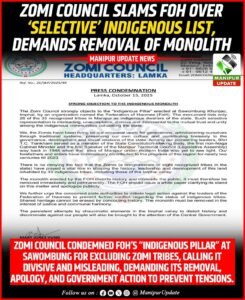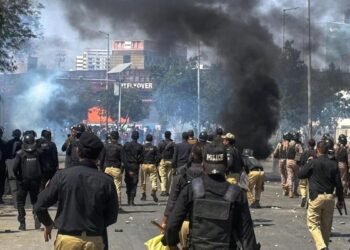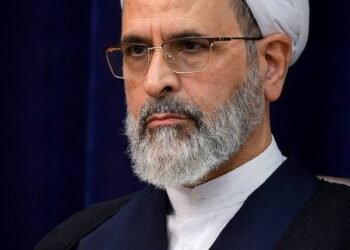The Zomi Council accused FoH of excluding Zomi tribes from the list of indigenous groups, alleging distortion of history and a threat to communal harmony in Manipur.
BY PC Bureau
October 15, 2025 — The Zomi Council has criticized the Federation of Haomee (FoH) for erecting an “Indigenous Pillar” at Sawombung Khunjao, Imphal, calling it “divisive, misleading, and detrimental to communal harmony.”
In a statement issued from its Churachandpur headquarters, the Council said the monument — which names only 25 of Manipur’s 33 recognized tribes as indigenous — deliberately excludes Zomi tribes and “distorts the historical record of the state.”
“The FoH’s act misleads the public and undermines Manipur’s shared heritage,” the Council stated, asserting that such selective representation threatens the unity among the state’s indigenous communities. “The Zomis have lived on our ancestral lands for generations, preserving our culture and contributing to Manipur’s governance and social fabric through traditional systems,” it added.
The Zomi Council demanded the immediate and permanent removal of the monolith, a public apology from the Federation of Haomee, and a clear clarification of its intent. It also urged the state government to initiate legal action against FoH leaders to prevent further conflict over indigenous identity.

“There is no denying that the Zomis, a conglomerate of eight recognized tribes, have played a vital role in shaping Manipur’s history and leadership,” the Council emphasized, recalling the contribution of figures such as Shri T.C. Tiankham — the first non-Naga Cabinet Minister and Speaker of the Manipur Territorial Council in 1948.
Read: Militants Ambush Assam Rifles Near Myanmar Border, 4 Jawans Injured
The statement warned that “persistent attempts by chauvinistic elements in the Imphal valley to distort history and discriminate against Zomi people” could inflame tensions, urging the Central Government to intervene and safeguard the community’s historical and cultural identity.
Earlier, on October 13, the Hill Tribal Council (HTC) of Moreh, Tengnoupal District, also issued a strong condemnation of the FoH’s “Indigenous Pillar,” accusing it of deliberately sowing division among Manipur’s communities.
Calling the monument a “distortion of historical facts,” the HTC said the structure had deepened existing social fractures — a divide allegedly worsened by the state government’s “silence and inaction,” which it described as tacit approval of hostility between warring groups.
HTC interpreted FoH’s actions as a tacit acknowledgment of the Kuki-Zo community’s aspiration for separation from Manipur, urging that the hill areas inhabited by Kuki-Zo tribes be placed under direct Central administration as a Union Territory named Outer Manipur.
Citing repeated instances of ethnic violence and the displacement of Kuki-Zo people from the Imphal Valley, the HTC asserted that coexistence under a single administration had become “practically impossible.” The council said the demand for a separate territorial arrangement was a necessary step to ensure peace, security, and justice for the hill tribes.
“The Government of India must recognize the Meitei community’s preference for separation and, in the same spirit, acknowledge the legitimate aspirations of the Kuki-Zo people,” the HTC urged, calling for the immediate creation of a Union Territory with a legislature for the Kuki-Zo community.













